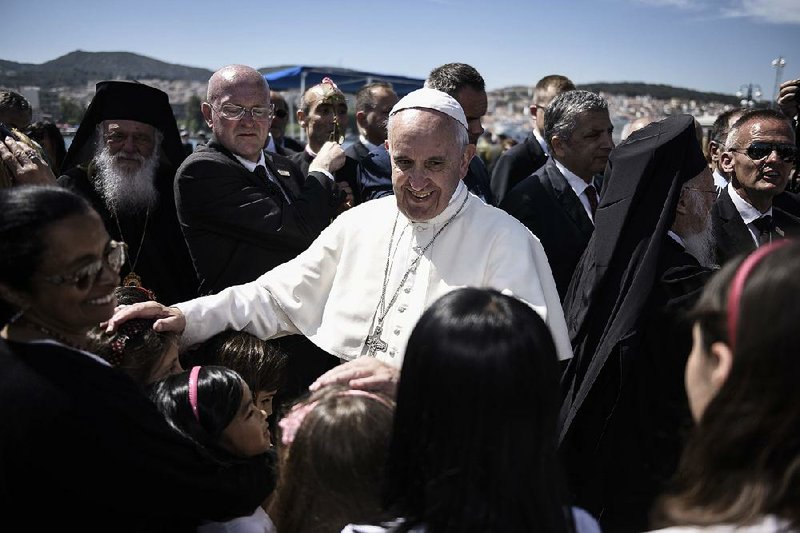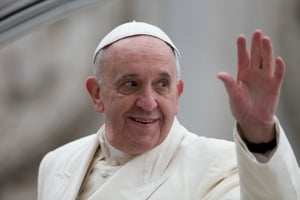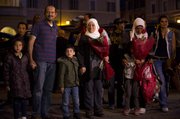MYTILENE, Greece -- Pope Francis made an emotional visit into the heart of Europe's migrant crisis Saturday and took 12 Syrian Muslims, including six children, with him back to Rome aboard the papal plane.
RELATED ARTICLE
http://www.arkansas…">Sanders greets pope, says thanks
The action punctuated the pope's pleas for sympathy to the crisis confronting the migrants just as European attitudes are hardening against them.
Those taken to Rome were three families -- two from Damascus and one from Deir el-Zour -- whose homes had been bombed in the Syrian war, the Vatican said in a statement as the pope departed the Greek island of Lesbos, where he had visited the Moria refugee camp.
"The pope has desired to make a gesture of welcome regarding refugees," the statement said.
The announcement capped a brief trip by the pope to Greece that again placed the plight of migrants at the center of his papacy.
"We have come to call the attention of the world to this grave humanitarian crisis and to plead for its resolution," Francis said during a lunchtime visit to the Moria camp, where leaders of Eastern Orthodox Christian churches joined him.
"As people of faith, we wish to join our voices to speak out on your behalf," Francis continued. "We hope that the world will heed these scenes of tragic and indeed desperate need, and respond in a way worthy of our common humanity."
Boris Cheshirkov, spokesman for the United Nations' refugee agency said the decision by the pope to take refugees with him was "a gesture of solidarity and a humanitarian act."
Upon greeting Francis at the airport, Greek Prime Minister Alexis Tsipras called his visit "historic," saying that it came at a time when "some of our partners -- even in the name of Christian Europe -- were erecting walls and fences to prevent defenseless people from seeking a better life."
While the announcement had the appearance of a surprise, Francis told reporters on the plane ride home that the relocation of the refugees had involved planning and paperwork by the governments of the Vatican, Italy and Greece.
"Their privilege is that they are children of God," Francis said of the selection of the families.
Francis also showed reporters two drawings given to him by children in the Moria camp. One showed children drowning in the sea. The other showed the sun crying.
"The children have these things in their minds, and it will take time before these memories go away," the pope said. "If the sun is able to cry, so can we. A tear will do us good."
In Rome, the Catholic charitable association Sant'Egidio will help care for the families and try to find them work.
The families were treated to a lively welcome Saturday night, with drummers thumping, a crowd applauding and the three mothers receiving a single red rose.
Nour, a mother of a 2-year-old, and her husband, Hasan, are both engineers who lived in Zabatani, a mountainous area near the Lebanese border that has been bombed.
"I thank you for what you have done," Nour said of the pope. "I hope this gesture has an effect on refugee policy."
Ramy and Suhila, a couple in their 50s, traveled from Deir el-Zour, a Syrian city close to the Iraqi border that was devastated in street-by-street fighting between Islamic State militants and government troops. They arrived in Greece with their three children in February from Turkey. Ramy is a teacher, Suhila a tailor, Sant'Egidio said.
The third family, Osama and Wafa, are from the Damascus suburb of Zamalka. The younger of their two children still wakes each night -- and even stopped speaking for a time -- apparently from the trauma of the war and the journey to Europe, they said.
No last names were given for any of the migrant families.
Sant'Egidio's refugee chief, Daniela Pompei, said the three families had been given Italian humanitarian visas and would now apply for asylum.
Upon landing Saturday in Lesbos, Francis held a brief private meeting with Tsipras, before traveling across the island to the detention center in Moria, where people are held as they await rulings on their asylum applications -- or as they wait to be deported under a recent agreement struck between the European Union and Turkey to curb migration.
Beginning last summer, hundreds of thousands of migrants, mostly from Syria, Iraq and Afghanistan, have poured into Lesbos after paying smugglers to make the short sea journey from Turkey. The procession through Greece and the Balkans toward Germany plunged the European Union into a political crisis and eventually led several countries to restrict or close their borders.
The deal with Turkey includes a provision under which migrants arriving in Greece can be swiftly deported back to Turkey. Since the deal took effect last month, the number of migrants arriving in Lesbos has dropped sharply -- even as the numbers arriving in Italy are steadily rising.
Many human-rights groups have criticized the European Union's new policy of deporting some migrants back to Turkey. The Vatican made sure that the 12 selected Saturday had arrived on Lesbos before a March 20 deadline, and were therefore not subject to any possible deportation to Turkey.
At the migrant camp, Ecumenical Patriarch Bartholomew, the spiritual leader of the world's Eastern Orthodox Christians, reminded Europeans and their leaders that Christians and others are judged on how they treat the powerless.
"The world will be judged by the way it has treated you," Bartholomew told the migrants. "And we will all be accountable for the way we respond to the crisis and conflict in the regions that you come from. The Mediterranean Sea should not be a tomb."
Thousands of migrants have drowned in the Mediterranean, including a child whose limp body washed ashore last year on the Turkish coast. A photograph of the child became a searing icon of the migrant crisis.
"I hope that we never see children washing up on the shores of the Aegean Sea," said Archbishop Ieronymos II, the leader of the Greek Orthodox Church, who called for a greater response by the United Nations.
At the Moria center, Francis slowly walked along a line of migrants, many of them Muslims, greeting people as some waved handwritten signs with slogans like "Freedom of Movement." Others propped their children on their shoulders or held out smartphones to photograph the pope.
Inside a large white tent, Francis greeted a woman in a headscarf as she cradled her baby, as well as other families. A small boy stepped forward and handed him a picture drawn with crayons. An Iraqi mother asked Francis to help her find medical care for her child's bone cancer.
At one point, a man began wailing as Francis placed his hands on the man's head.
"Please, Father, bless me!" the man shouted. "Please, Father, bless me!"
Information for this article was contributed Jim Yardley of The New York Times; by Derek Gatopoulos, Nicole Winfield and Elena Becatoros of The Associated Press; and by Griff Witte and Anthony Faiola of The Washington Post.
A Section on 04/17/2016



